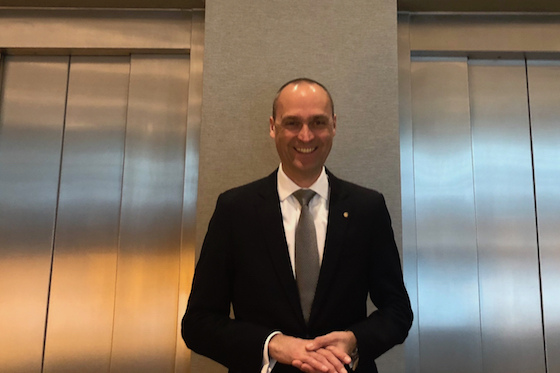“There is absolutely no short cut when running 100 kilometers (62 miles). Just like being in charge of a hotel, you need to have a plan and, while allowing for flexibility, stick to it,” says Marten Schoenrock, general manager of the 414-room InterContinental Warszawa, in Warsaw, Poland.

The annual Run Ultra 100-kilometer event, held in June, starts at the Kongresshaus in Biel, Switzerland. This year Schoenrock was, for the fourth time, among the 1,300 who started. Not all finished, of course, but although he struggled at “km 70” (44 miles) taking the shuttle bus was not an option, and he roared in home after 11 hours, 51 minutes.
“Every time I run an ultra I prepare for about six months beforehand. I use a training plan adapted from an ultra running guide. I do not run every day but when I do it is different lengths, never anything longer than 50 kilometers (31 miles). Sometimes a gym workout gets into the schedule. It is essential to eat healthily year-round and before the race I devour a whole pizza. I snack along the way – bananas, oranges, energy gels and bars, pretzels, vegetable bouillon, sandwiches. Afterwards, I have a grilled salmon filet or just another large pasta dish,” he shared. His wife meets him at several points en route, to cheer him on, and again at the finish, back at Biel’s Kongresshaus.
He reckons it takes a full 10 days for his body to recover. Why does he punish himself? “As I run I think about everything, thoughts are all jumbled up. I find out a lot about myself. The satisfaction is so rewarding.”
There is also, during the run, a continuous threat – as in the hotel world – of uncertainty. During a career that has included such locations as Tashkent, Uzbekistan, Schoenrock has experienced political and other unrest. While running, he knows he could trip at any moment. He is also sure that sudden excruciating muscle or other pain is more than probable, sometimes several times during a race (“I have to be mentally as well as physically prepared,” he declared).
He is also, during a race, spurred on by the fact that he cannot let down the hotel’s 280 full-time colleagues, who are supplemented by 70 regular-casuals. He knows he is particularly supported by the hotel’s celebrity chef, Karol Okrasa, who is also a marathoner (the usual kind) — both on the flat and vertically, taking part in a race to the top of the 44-floor hotel building.
The entire team, however, has an unusually strong rapport. Although it is higher in such departments as front desk, the average annual turnover throughout the hotel is currently 23%, in a city where industry norm is considerably higher – Warsaw’s unemployment is a mere 2.6%. There is noticeable team spirit in this hotel: When Director of Revenue Management Justyna Olligio was awarded InterContinental Europe’s best colleague of the year 2018, any department, everyone celebrated.
Schoenrock admits that many of his leadership skills came from a compulsory 15-month stint in the army back in his native Germany – “I drove a tank, and perhaps initially I was rather arrogant, and I certainly then had an issue with some superiors and I didn’t make much of an effort to understand their point of view,” he said. After that, in 1994, he joined InterContinental Hotels and Resorts, and he has been with the company, now IHG, ever since.
“Today I know that just as in an ultra-run, I need those around me. Being surrounded by others also wanting to do their best spurs me on.”
